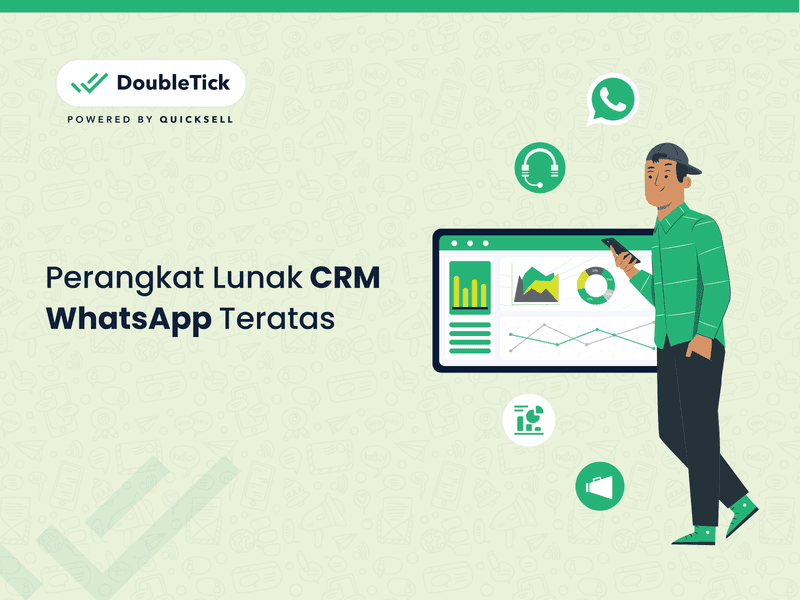.jpg)
Contents
- Introduction
- Understanding the Importance of Compliance for WhatsApp Business API
- Implementation and Setup of WhatsApp Business API
- How to Get DoubleTick
- Key Regulations and Guidelines Applicable to WhatsApp Business API
- Ensuring Data Protection and Privacy Compliance
- Implementing Anti-Spam and Messaging Compliance Measures
- Complying with Consumer Protection Regulations
- Conclusion
- Frequently Asked Questions
Introduction
To maximize the awesomeness of WhatsApp Business API and abide by regulations, guidelines and best practices should be followed. Data protection should be prioritized, meaning secure protocols, encryption and regular data audits should be implemented. Consent must be obtained from customers before sending messages or using customer data, with opt-in mechanisms or clearly explaining the purpose and content of the messages.
It's also vital to stay up-to-date with the latest regulations and guidelines. Subscribe to newsletters, join forums and keep an eye on industry news. Last but not least, get legal advice from professionals specializing in data protection and privacy laws.
By doing all this, businesses can use WhatsApp Business API as a communication channel whilst maintaining compliance!
Understanding the Importance of Compliance for WhatsApp Business API
Compliance is a must for maintaining the integrity of WhatsApp Business API. It ensures you follow legal requirements and look after user privacy. Companies must understand the importance of compliance to avoid penalties and protect their reputations.
For starters, compliance is essential to meet legal obligations. By following regulations, businesses can stay within the boundaries defined by authorities. This not only helps them avoid legal trouble, but it also boosts trust from users who rely on WhatsApp for secure communication.
Plus, compliance is necessary to secure user privacy and data. By implementing things like encryption and consent measures, businesses can guarantee sensitive info shared through the API stays confidential. This boosts user confidence in the platform, leading to more engagement and satisfaction.
Also, compliance helps businesses stay competitive in the market. As data protection laws become stricter, companies that prioritize compliance can show their commitment to responsible data handling. This can attract more customers who value privacy, ensuring long-term success.
Implementation and Setup of WhatsApp Business API
There are two ways through which you can get WhatsApp Business API:
- Direct sign-up from Meta
- Through a solution provider such as DoubleTick
Directly from Meta
You can directly apply for the official WhatsApp Business API from Meta but going down this path isn’t particularly efficient. If you're a mid-scale company you'd need a developer to set up the API which is too labour-intensive and technically challenging.
Through a Solution Provider
A solution provider will get quick approval and can swiftly set up the WhatsApp Business API platform for you. For instance, with DoubleTick, the process takes between two to three days. With DoubleTick the possibilities to scale your business is endless.
How to Get DoubleTick
Kindly email us at grow@quicksell.co or Click Below to get a FREE DEMO to know about our product offering, features and pricing plans.
Now transform WhatsApp into the ultimate sales engine to delight customers and drive revenue with DoubleTick!
Read more about DoubleTick here - What is DoubleTick and How This Could Be Your Greatest WhatsApp Marketing and Sales Tool
Key Regulations and Guidelines Applicable to WhatsApp Business API
The WhatsApp Business API is subject to regulations and guidelines businesses must follow. These rules are to ensure data protection, privacy, and communication laws are met. By understanding and following these regulations, businesses can maintain a secure and compliant environment when using the API.
Check out the table below for details on the relevant regulations and guidelines:
Regulating Body | Regulation/Guideline | Description |
|---|---|---|
Data Protection Laws | General Data Protection Regulation (GDPR) | Protects personal data of individuals in the EU. |
Privacy Laws | California Consumer Privacy Act (CCPA) | Gives Californian residents control over their info. |
Communication Laws | Telephone Consumer Protection Act (TCPA) | Addresses telemarketing calls and texts to consumers. |
Businesses should also be aware of other details. For example, they must implement an opt-in process for users to receive messages through the WhatsApp Business API. And keep records of user consent to show compliance with data protection laws.
For a secure and compliant experience, businesses should stay informed about these key regulations and guidelines. They must make sure data protection, privacy, and lawful communication practices are maintained.
Protecting your data is like protecting a vampire from sunlight - one chance to get it right, or you'll end up with some serious byte marks!
Ensuring Data Protection and Privacy Compliance
Data protection and privacy compliance are essential for businesses using the WhatsApp Business API. It ensures customers' sensitive info is secure, and used responsibility. Following regulations lets companies gain trust and dodge legal issues. To enhance compliance further, businesses should update software, do security audits, and give staff training on data protection.
Many countries have strict regulations to protect user privacy and control personal data. An example is the EU's General Data Protection Regulation (GDPR). It requires businesses to get explicit consent for data processing, give users rights over their data, and keep strong security measures.
A company failed to uphold customers' privacy rights, and suffered a data breach which exposed sensitive info. This destroyed their reputation and got them hefty fines from regulatory authorities.
Data protection and privacy compliance isn't just about following regulations. It's also about ethical practices that prioritize user privacy and build trust with customers. Companies can successfully navigate data protection by implementing strong security measures, getting user consent, and staying up to date on evolving regulations.
Implementing Anti-Spam and Messaging Compliance Measures
Robust anti-spam measures are vital. Put in place filters and algorithms to detect and block spam messages. Update these measures regularly to stay ahead of changing spam tactics.
Be aware of local and global regulations regarding messaging, such as opt-in requirements and message frequency limits.
For respect and privacy, give users the ability to easily unsubscribe from further messages.
Obtain explicit consent from users before sending promotional or marketing messages. This can be done via a checkbox or confirmation process during sign-up.
In addition, audit messaging practices and procedures. Educate staff on compliance guidelines. Maintain accurate records of user consent and message history. Keep up-to-date with changes in messaging regulations. Doing all this will safeguard your WhatsApp Business API operations and ensure compliance with relevant regulations. Complying with consumer protection regulations is like having a safety net for your business.
Complying with Consumer Protection Regulations
Secure consent from customers before initiating communication. Supply accurate info about your biz, including contact info & opt-out instructions. Respect customers' privacy by protecting their data & using it for the intended purpose. Abide by spam messaging regulations, ensuring all messages sent are pertinent & of value to the recipient.
Record all conversations & interactions for compliance & dispute resolution purposes. Stay informed of laws & regulations governing consumer protection in your jurisdiction, as these can vary.
Failure to comply with consumer protection regs can result in fines, rep damage, & loss of customer trust. Proactively adhering to these guidelines demonstrates commitment to ethical biz practices & builds strong relationships. Don't miss out on the chance to protect you & customers. Take steps now to ensure compliance with consumer protection regs on WhatsApp Business API. Be informed, transparent & prioritize the well-being of those you serve. Together, we can create a safe digital marketplace!
Conclusion
In today's digital world, staying compliant with regulations is vital for businesses using WhatsApp Business API. By following the rules and introducing necessary measures, companies can ensure smooth operations while keeping trust and security.
It's key to understand the regulations relevant for your industry and region. Compliance might be different from one country to another, so in-depth analysis is required. This includes knowing data protection laws, privacy policies, and any other related orders that concern your business.
After understanding the regulations, you can begin to set up the suitable measures within your WhatsApp Business API. This requires strong encryption of data, building secure authentication procedures, and forming appropriate access controls. Audits should also be done regularly to find any weaknesses or places to make better.
It's also important to teach your team about compliance best practices. By offering training sessions and resources, you enable your staff to manage customer data correctly and meet all applicable regulations. Keeping a continuous discussion about compliance in the organization helps make a culture of responsibility and makes sure everyone knows their part in abiding by regulatory standards.
A major multinational corporation experienced the consequences of non-compliance. Despite understanding the regulations around customer data security, they failed to put suitable measures in place within their WhatsApp Business API functions.
The result was a huge data breach exposing sensitive customer information. This resulted in major financial losses and permanent harm to their reputation. The incident was an eye-opener for the company as they saw the serious results of not paying attention to compliance needs.
Frequently Asked Questions
1. What are the main regulations I need to comply with when using the WhatsApp Business API?
Answer: The main regulations you need to comply with when using the WhatsApp Business API include data protection laws, privacy regulations, anti-spam laws, and any other relevant local regulations specific to your business or region.
2. How can I ensure data protection compliance when using the WhatsApp Business API?
Answer: To ensure data protection compliance, you should implement secure data storage practices, obtain user consent for data processing, and provide clear privacy policies and terms of service. Additionally, regularly review and update your data protection practices to align with regulatory requirements.
3. How can I avoid violating anti-spam laws with the WhatsApp Business API?
Answer: To avoid violating anti-spam laws, only send messages to users who have provided explicit consent to receive them. Implement clear opt-in and opt-out mechanisms, respect user preferences, and ensure your messaging practices are transparent, relevant, and non-intrusive.
4. Do I need to retain user data when using the WhatsApp Business API?
Answer: It is important to understand and comply with the local data retention regulations applicable to your business. While WhatsApp imposes certain limitations on data retention, it is advisable to consult with legal experts to determine the specific requirements for your region or industry.
5. How can I handle user inquiries and requests for data deletion?
Answer: Provide a straightforward process for users to inquire about their data or request its deletion. Make sure to respond promptly and ensure that user data is securely deleted upon request. Appropriate mechanisms should be in place to handle such inquiries efficiently and transparently.
6. Are there any restrictions on the types of content I can send via the WhatsApp Business API?
Answer: Yes, WhatsApp has guidelines regarding the types of content that can be sent via the API. You should avoid sending prohibited content such as spam, malicious links, adult content, or anything that could infringe upon users' privacy or violate community standards.







